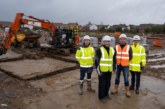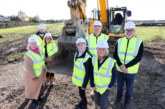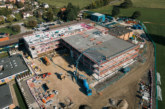
The IHEEM Conference at Healthcare Estates key themes for this year are governance and assurance, cost saving, efficiency, patient care, and the patient experience. With accountability and fire safety also very topical at the moment, the conference programme aims to cover all key areas affecting Estates and Facilities professionals now and in the future.
Strategy and Leadership, Estates and Facilities Management, Planning Design and Construction are the cornerstones around which the conference is based. Day one opens with Simon Corben, Director and Head of Profession, NHS Estates and Facilities at NHS Improvement. Simon will discuss the need for clearer corporate governance and assurance, as well as reflecting on his first six months in office. A panel discussion will follow, picking up the Governance and Assurance theme raised and will represent the professional perspective of a Hospital Trust and the parallel experience of an institution in higher education. Moderated by IHEEM President, Pete Sellars, Panellists joining Simon Corben include: Kevin Oxley, Head of Estates and Facilities, County Durham and Darlington Acute NHS Trust and Paul Kingsmore, Director of Services, Manchester Metropolitan University.
Day two will open with Lord O’Shaughnessy, who advised the former Prime Minister from 2010 to 2011, David Cameron’s former Downing Street Policy Chief was recently appointed as a Minister at the Department of Health in Theresa Mays recent reshuffle.
Lord O’Shaughnessy replaced Lord Brampton as a minister for NHS Productivity. As Parliamentary Under Secretary of State for Health, Lord O’Shaughnessy will lead on a range of policy areas, including responsibility for NHS Property Services and Community Health Partnerships, which also includes NHS procurement, NHS security management and estates and facilities.
Conference streams
The Strategy and Leadership stream will cover modern day management of the NHS Estate and the most appropriate metrics to be able to do this whilst meeting cost and efficiency savings targets. It will also look at acquisitions and mergers as well the important subject of rationalising estates — sharing resources, overcoming historical working practices to achieve a new normal, and blending geographical barriers to provide the best, most effective patient care for the local population.
Engineering and Facilities Management will consider safety and accountability in fire prevention, as well as practical aspects of estates management, including energy procurement, the sustainability of facility management practices, the measurable impact of a building on the occupants’ health, the perennial bugbear of parking on hospital sites, and incremental improvements that can improve a site’s car parking efficiency and access.
Architects for Health will present a number of case studies in the Planning Design and Construction stream, demonstrating the case for appropriate, thoughtful design for healthcare buildings with very different uses. The case studies cover a multi-purpose healthcare facility used as a community space as well as a place of treatment; a combined research establishment and hospital facility, bringing medical research closer to patient treatment for the benefit of future generations; the best in design for mental health treatment, and a modern hospital development — a stark contrast to the 1960s building that it replaces, with the emphasis on patient environment, privacy, and natural light for the benefit of patients and staff.
In addition to the expert contribution of Architects for Health, the role of buildings in dementia care and looking after an elderly population by adapting environments for ‘ageing in place’ will be considered, together with optimising the efficiency and experience of accident and emergency departments, particularly for children. Healthcare institutions and the community are increasingly blurring boundaries — with new housing developments considering the provision of healthcare within their planning, and community care hubs being the first port of call for primary care, relieving the strain on hospitals, and fitting the geographical demand for care in a more logical way.
Modular building as a high quality quick fix for additional treatment space will also be discussed, using project examples and making a case for this approach as the way forward in creating durable flexible facilities with minimal disruption to existing services on site.
Exhibition
The exhibition will provide delegates with a focal point for discussions during breaks in the conference — this year sees over 220 companies demonstrating the latest technologies, products and services. The exhibition also features product demonstrations and discussions in the six theatres, which include two new theatres devoted to ‘Apprentices’ and ‘Facilities Management’.
The Apprentice Theatre will showcase the work done by apprentices in the healthcare sector and the companies employing them. Supported by WISE and Investors in People, theatre sponsor Troup Bywaters & Anders will focus on the significant changes to the Government Apprenticeship scheme, including the introduction of new roles and changes to how training will be funded. The second new area, The Facilities Management Theatre, features a two-day programme focusing on hard and soft FM in healthcare.
Healthcare Estates returns to Manchester Central on the 10th & 11th October. For more details about the event and to register visit: www.healthcare-estates.com.








